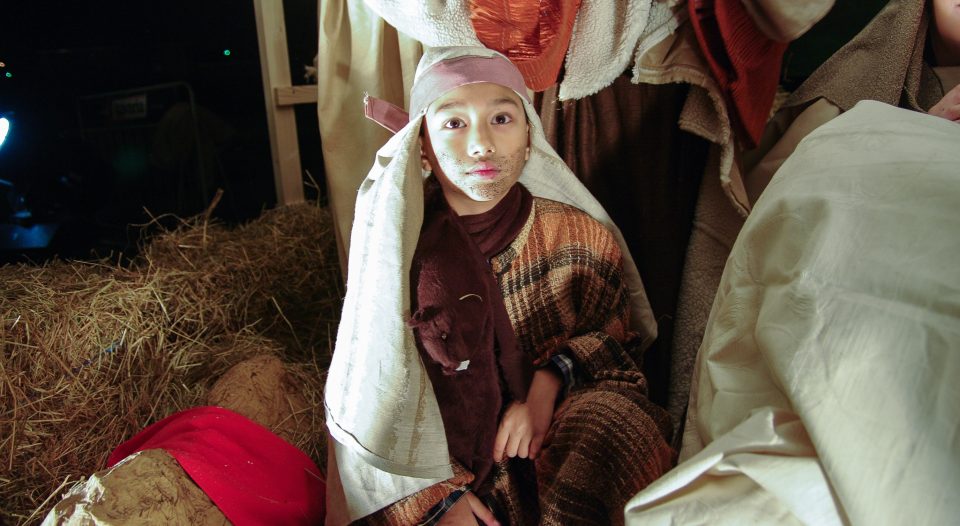Lectionary blog for Dec 25, 2022
Christmas Day
Isaiah 62:6-12; Psalm 97;
Titus 3:4-7; Luke 2:(1-7) 8-20
How many Christmas pageants have we watched? I’m 40 this year, and I bet I’ve either seen or been in at least that many. Some years we attend two or three pageants at different congregations with friends and nieces and nephews. One of my favorite things about these plays is what they get right. Sure, there are lots of historical inaccuracies, but one thing I love is that the shepherds are kids, and usually mixed-gendered. I think seeing that accuracy played out is key for understanding what Luke is trying to convey in this week’s Gospel.
When it comes to shepherds, many of us think of European traditions, where middle-aged or older men are entrusted with the sheep. That doesn’t seem to have been the consistent pattern in the part of the world where Jesus was born. The shepherds usually were the youngest sons or daughters or foreigners working off debts. Abel the shepherd was younger than Cain the farmer. Rachel, the youngest daughter, was the shepherd for her family (until Jacob took over to pay a marital debt). Zipporah and her sisters were the shepherds for their family (again, until a foreigner took over to pay a marital debt). David, the youngest of his brothers, was his family’s shepherd. Jacob’s decision that Joseph’s older brothers would be entrusted with the shepherding duties seems to have been an ongoing issue and a sign of poor parenting. Even in much of Southwest Asia and North Africa today, young children, frequently girls, are the ones entrusted with looking after the flocks. But why is this important?
Just as Luke will tell us that the first people to bear witness to Jesus’ resurrection were women (24:1-10), the Gospel says the first witnesses to bear witness to Jesus’ birth, and the accompanying heavenly celebration, were children, probably many girls among them. The scene plays out a bit differently in our minds if kids out by a campfire suddenly become terribly frightened because an angel is standing next to them (Luke 2:9). The shepherds weren’t old men cowering in the fields but kids absolutely freaking out and screaming. Imagine their wonder as the heavens opened and angels sang praise songs. After the songs ended, the young shepherds hurried to the city (2:11, 15) to see the newborn messiah.
Meanwhile, Mary and Joseph were in the warm and cozy stable/storage room in the basement of Joseph’s extended family’s home. The whole point of their making the journey to Bethlehem was that Joseph’s extended family was based there. There was no room for a couple about to give birth in the family’s guest room. Katalyma is translated elsewhere in Luke (22:11) as “upper room” or “guest room,” as it should be here. It should probably not be understood as a stand-alone inn, but as a space in the home reserved for guests and holiday meals. So Mary and Joseph had a measure of privacy in the most insulated part of the home during the cool evening. The rest of the house was certainly full to overflowing with relatives who, no doubt, were taking turns checking on the recently enlarged family.
The shepherds weren’t old men cowering in the fields but kids absolutely freaking out and screaming. Imagine their wonder as the heavens opened and angels sang praise songs.
Into this scene, several young shepherds burst, telling tales about angels singing in the sky and demanding access to the house’s stable to see the newborn messiah, lying in a stone watering trough, wrapped in cloths so that he would not startle himself awake. Imagine children, who won’t take “no” for an answer, tromping through the house, looking for a baby whom the exhausted parents are trying to keep asleep. Imagine children, who as shepherds are used to taking care of life, encountering a newborn. We have a baby, though no longer a newborn, in our family. My older children are incredibly sweet with him, always wanting to hold him and help feed him. They aren’t always the gentlest or quiet when I want our baby to sleep, but they dote on him and look for ways to make him smile and giggle all the time.
I think that’s exactly what these shepherds were like. They couldn’t wait to tell Mary, Joseph and everyone at the home (Luke 2:18) about the signs they had seen in the sky and in the stable. And they couldn’t wait to tell the new mother what the angels had said (17). Then, after the young shepherds left Mary and Joseph’s extended family, they went back to their flocks, glorifying and praising God for all that they had heard and seen (20). Mary, too, treasured these things, and pondered them in her heart (19).
Is there anything better than the excitement of children at Christmas? The Gospel of Luke doesn’t think so. That’s why we have this story of young shepherds, boys and girls, who see some angels and then hustle off to see the baby Messiah. These young shepherds are my favorite part of any Christmas pageant, and one of my favorite parts of the nativity story. Just as heaven can’t hold its exuberance and bursts forth in song, so let us encourage children to lead us in their exuberance in celebrating the good news that Jesus is born for us this day.





